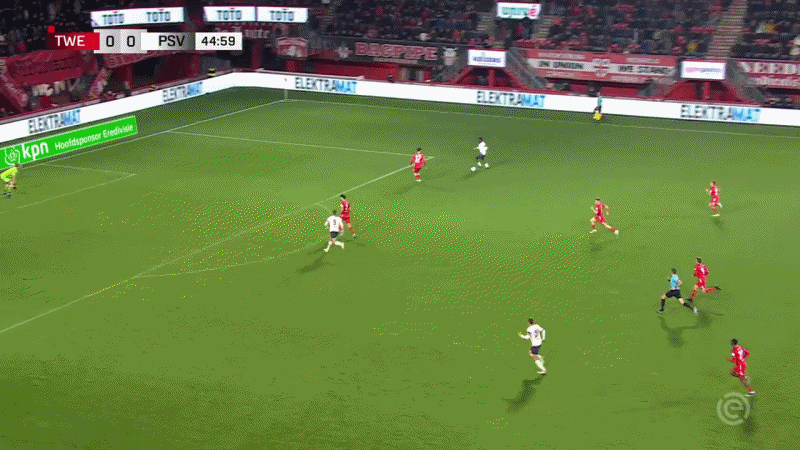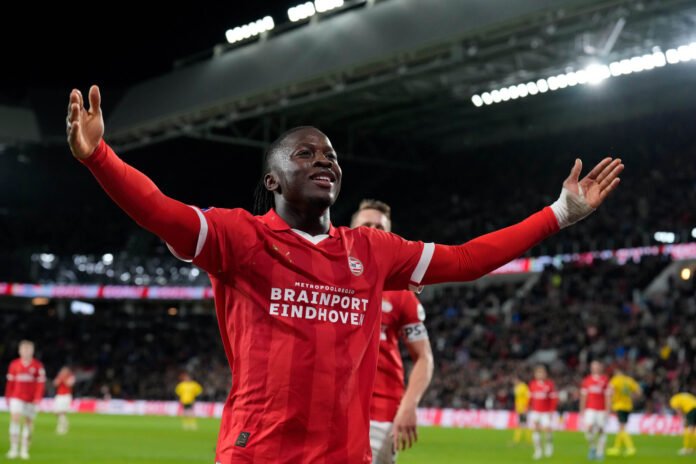Johan Bakayoko is making a name for himself, as he and PSV Eindhoven continue to burn through the Eredivisie.
Peter Bosz’s side beat Excelsior 3-1 on Saturday, recording their 17th win from 17 games. Bakayoko, 20, has played from the right of Bosz’s 4-2-3-1, scoring three, assisting eight, and playing beautifully.
PSV are a bold, attacking team who transition quickly, break purposefully and score in all sorts of ways, and Bakayoko is in step with that rhythm. But he is emblematic of his team’s variety, too. Dynamic and highly skilled. Light-footed, but with tremendous shooting power. An out-to-in winger who can run but create, he has a battery of abilities that have made him a Belgium international and drawn the interest of clubs all over Europe.
Come the end of the season, barring injury or a serious slump, he will surely succeed Xavi Simons as young player of the year in the Netherlands. He was the Johan Cruyff Talent of the Month — the Eredivisie’s young player of the month award — three times in 2023, and with a European Championship approaching, 2024 should see him become more mainstream.
He is one of the most watchable young players in Europe, even if his momentum owes something to good fortune.
Bakayoko joined PSV from Anderlecht in 2019, when he was 16. The move generated little expectation and that was partly because the club had so many talented wide forwards in his position. Hirving Lozano left for Napoli that summer, but Steven Bergwijn would not be sold to Tottenham until the following January. Donyell Malen was still at PSV, too, and was about to enjoy two profitable seasons, while Cody Gakpo and Noni Madueke were on the cusp of breakthroughs. PSV had a steady of supply of wide forwards.
Bakayoko was promoted into the senior squad properly in 2022, during Ruud van Nistelrooy’s only year as head coach. At the beginning of the season, Japan winger Ritsu Doan was sold to Freiburg, Portuguese forward Bruma transferred to Fenerbahce and, in the winter window, Gakpo and Madueke moved to Liverpool and Chelsea. Between them, those players had made 97 appearances in the 2021-22 season. Rarely do pathways clear as quickly or dramatically as that, but Bakayoko got his chance and took it. From February 2023 onwards, he started 14 straight games.
Bakayoko’s capacity to beat defenders and accelerate beyond them drew plenty of attention. By the end of the 2022-23, he was averaging 6.69 progressive carries and 0.85 goal-creating actions per 90 minutes, according to Opta, good enough for the top 97th and 95th percentiles respectively. Bakayoko might have joined Brentford, had it not been for a conversation with Bosz, who replaced Van Nistelrooy in the summer of 2023.
Bakayoko’s dribbling has been particularly impressive (NESimages/Perry vd Leuvert/DeFodi Images via Getty Images)
“I told him, ‘If you go now, you will be seen as the small Belgian player who came from PSV,” Bosz told The Athletic in December. “If you win titles with us, perform in the Champions League and play for the Belgian national team, then it will be different. In the end, Johan said he wanted to stay and he was right.”
Neither could have known just how right that decision would be. Bosz has always put faith in young players, but he has built a quicker, more vertical PSV team and one which presses higher and more intensely than the one he inherited. For someone of Bakayoko’s technical and physical virtues, it has proven a perfect environment.
The challenge for Bakayoko, since his days as a youth player, has been to become less individualistic. Data comparisons between this Eredivisie season and last show evidence of that happening. His passes into the penalty box have risen from 2.29 per 90 to 3.09, his expected assists have grown from 0.29xA per 90 to 0.43, and yet his shot volume and dribbling success have still grown. Those changes partly reflect how dominant PSV have been.
The sequence below, taken from PSV’s win over Twente in November, shows a good example of how.
Having found the opportunity to drive towards the penalty box, Bakayoko had, to a blinkered player, the chance to manufacture a low-percentage shooting opportunity. But rather than forcing an attempt, he delayed his decision long enough for Joey Veerman to break into the box on the blind side of the defenders. Bakayoko squared a pass for Veerman to score.

Below, a week later, he teased more development in how he created the first goal against Feyenoord in a 2-1 win.
Bakayoko received a pass, took a touch, and timed a cross to the back post for Ismael Saibari to give PSV the lead.

Unlike his assist against Twente, which was reward for slowing down the game and delaying a decision, it showed he could speed up the play by taking a bolder option.
A coach, who works with players in the Champions League, Premier League and English Championship, but who has been granted anonymity to protect relationships, believes the physical and technical control in Bakayoko’s game is key to his growing variety.
“His ability to understand how to use speed is vital,” he says. “Lots of players who have searing pace and power think going full speed all the time is the best way. Bakayoko understands when to slow down and draw players in. His ball striking off his left foot on the run is usually clean and he can really snap it quickly after his final exit touch — the one which takes him away from a defender — which means he can shoot quickly and catch keepers by surprise.”
The speed with which he shoots is effective. That ‘snapping’ technique was evident in goals he scored away to Lens in Europe and against Sparta Rotterdam in the Eredivisie; both had violent power from a short back-lift.
While there is plenty to admire, the coach still sees areas that can be improved. “His right-foot ball-striking can be wild and while his unpredictability is a major strength, it can also make him harder for his own team-mates to anticipate. That shows in how most of the goals he scores are still quite individual, rather than being at the end of team moves.”
What happens next is an interesting question. Opinion in the Netherlands is divided by whether Bakayoko will rise to the top or find a more modest home, perhaps at a Europa League club or in the Premier League’s monied mid-table. One of the reasons to be cautious is his unsuitability to teams who regularly encounter deeper defences.
“He needs to understand how to recycle the ball better in the final third,” says the coach. “If he can’t immediately attack, then can he find his team-mates and move the opposition’s defensive block around?”
That is a key question, because it will likely determine his future. Bakayoko is contracted to PSV until 2026, so his transfer value will be highest this summer. Where he moves next will depend on what he is able to show in the remaining four months of this season.
Elsewhere in Europe:
(Top photo: Prestige/Soccrates/Getty Images)
Read the full article here


